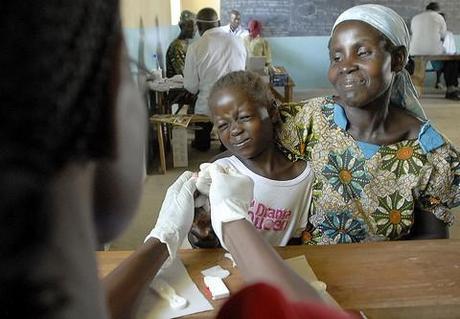
Far from perfect, but a promising step in the right direction. Photo credit: US Army Africa http://flic.kr/p/7WkSe2
Preliminary results from the large-scale trials from four African countries show that a new vaccine could save millions of children’s lives by halving the risk of malaria. The results, published in the New England Journal of Medicine (NEJM), were based on 6,000 children given the new ‘RTS,S’ vaccine and showed that the vaccine reduced the risk of contracting clinical malaria and severe malaria by 56 and 47 percent, respectively. The vaccine is the first of its kind. Malaria is a parasite, rather than a virus, which makes it much harder to vaccinate against, the New York Times noted. This is because the parasites changes shape as it moves through the body, making them difficult to target precisely.
The vaccine, being developed by GlaxoSmithKline (GSK), could potentially save millions of lives, but must wait for further test results. The trial is only partly completed, and is scheduled to continue for two more years, ultimately performing tests on more than 15,000 children. Recent global progress has been significant, with the World Heath Organisation (WHO) recently reporting a 20 percent drop in worldwide deaths from malaria in the last 10 years. Could this vaccine be the final piece in the puzzle, and lead the way to the end of malaria?
Promising. The Guardian quoted Andrew Witty, chief executive of GSK, saying “These data bring us to the cusp of having the world’s first malaria vaccine … It could also reduce the burden on hospital services, freeing up much-needed beds to treat other patients who often live in remote villages, with little or no access to healthcare.” The deputy editor of NEJM called the data “encouraging”, and the prospect of an effective vaccine against a disease that kills almost a million people every year is very exciting. Bill Gates, involved in funding the project, called it a “huge milestone.”
This vaccine “offers real hope for the future”, said Andrew Mitchell, Britain’s minister for international development, quoted by Reuters.
No silver bullet. In an editorial published alongside the paper, Nicholas White reminded that “this partially protective vaccine is not the sole solution to the control and elimination of malaria.” Used in conjunction with mosquito nets and insecticide, however, the new technology could be hugely effective.
Funding. As the trials continue, the question of funding will become critical to the project’s future. The Bill and Melinda Gates foundation has provided $200 million, while GSK has invested $300 million. GSK have promised to keep prices as low as possible, charging only 5 percent more than manufacturing costs. “We are not going to make any money from this project”, Witty said. According to the New York Times, Regina Rabinovitch of the Bill and Melinda Gates foundation warned that “any decision would be data-driven”, and that they would prefer a 100 percent effective vaccine. Gates is said to also be investing in a number of other potential vaccines.
“Nobody loves Bill Gates, but if he has funded a Malaria vaccine, it makes up for everything and is kind of more significant than the iPhone”, tweeted political blogger Guide Fawkes.
Marred by poor efficacy. Not everyone is quite so optimistic about the new vaccine’s prospects, or so enthused by the data released so far, which showed that the vaccine has “low efficacy for severe malaria.” On the website of science journal Nature, a variety of more pessimistic opinions are offered. ”Overall, it’s really disappointing in terms of what we had hoped”, said Adrian Hill, director of the Jenner Institute in Oxford, while Kim Mulholland from the London School of Hygiene and Tropical Medicine labelled the news “quite disappointing.” However, with a disease as prevalent as malaria, even a slight improvement could save millions of lives. The WHO has announced that, if further results are satisfactory, the vaccine could be rolled out as early as 2015.

